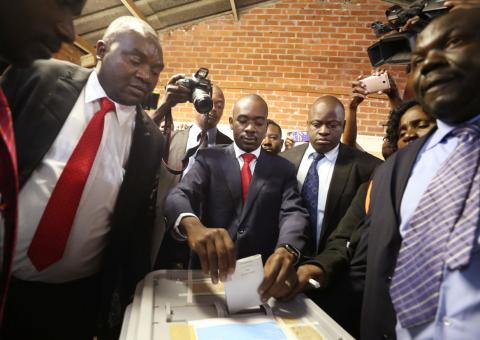Advertisement
Zimbabwe votes in first post-Mugabe poll, opposition cries foul
HARARE (Reuters) - Zimbabweans voted on Monday in the first election since former president Robert Mugabe was ousted in a de facto coup, with allegations of voter suppression raising fears of a disputed result.
Nelson Chamisa, the main challenger to President Emmerson Mnangagwa, a long-time Mugabe ally, gave no evidence for his claim that the Zimbabwe Electoral Commission (ZEC) was impeding voting in urban areas where he enjoys strong support.
"The people’s will being negated & undetermined due to these deliberate & unnecessary delays," Chamisa tweeted.
The ZEC was not immediately available to comment. It has denied Chamisa's previous allegations of bias.
A credible election is essential if Zimbabwe is to exit painful sanctions and secure the donor funding needed to stem chronic cash shortages.
Chamisa said his Movement for Democratic Change (MDC) would win if there was no "ballot mischief", making it likely he will challenge the outcome if Mnangagwa prevails, something likely to lead to street protests and possible violence.
Dozens of people were killed ahead of a runoff in 2008 between Mugabe and MDC-founder Morgan Tsvangirai, who died of cancer in February.
While absent from the ballot paper for the first time since independence from Britain in 1980, Mugabe emerged from eight months of obscurity on the eve of the election to announce he would vote for the opposition, surprising former ally Mnangagwa who accused him of striking a deal with Chamisa.
Mugabe, 94, one of the last "Big Men" of African politics, made no comment to reporters as he cast his ballot around lunchtime accompanied by his wife, Grace. A huge crowd gathered outside, some cheering, many booing.
Mnangagwa denied Mugabe's claim that the vote would not be free since it was being run by a "military government".
"I can assure you that this country is enjoying democratic space which has never been experienced before," Mnangagwa told public television after voting.
RUNOFF POSSIBLE
Opinion polls give the 75-year-old former intelligence chief only a slim lead over Chamisa, 40. There will be a runoff on Sept. 8 if no candidate wins more than half the votes.
Nicknamed "the Crocodile", an animal famed in Zimbabwean lore for stealth and ruthlessness, Mnangagwa, of the Zimbabwe African National Union-Patriotic Front (ZANU–PF), has been president since the military ousted Mugabe in a bloodless coup.
Elections under Mugabe were often marred by intimidation, rigging and violence but the consensus is the build-up to this vote has been better than before, although Chamisa complained about a flawed voters' roll and opaque ballot paper printing.
Chamisa, a lawyer and pastor, has attracted young and unemployed voters frustrated with nearly four decades of ZANU–PF rule.
"Victory is certain, the people have spoken," Chamisa said after casting his ballot in Harare as a cheering crowd chanted: "President! President! The president is here!"
"I have no doubt that by end of day today we should be very clear as to an emphatic voice for change," Chamisa said.
Polling stations opened at 7 a.m. (0500 GMT) and were due to close at 7 p.m. Zimbabweans are also electing 210 members of parliament and more than 9,000 councillors.
"I'll vote for Chamisa because it is a vote for change, it is a vote for the youth. Tomorrow we will have a new president," said Fabian Matsika, a security guard in Harare.
CREDIBILITY
"ZANU-PF is the only party that I have voted for," said Elizabeth Kamhunga, 67, after casting her vote at a school in the Harare suburb of Malbereign.
"We may have made some mistakes but I think President Mnangagwa is the only person who has the interests of Zimbabwe at heart.”
The European Union, the United States and the Commonwealth have sent observers.
“It is exciting to see so many Zimbabweans casting ballots," said former Liberian president Ellen Johnson Sirleaf, co-leader of the National Democratic Institute's observer mission.
"However the public’s faith in the secrecy of the ballot is essential for the credibility of the process. We urge the authorities to do everything possible to ensure the secrecy of today’s vote."
Mnangagwa has made a big effort to win over foreign opinion; hosting Western ambassadors, courting investors and patching up relations with white commercial farmers who were violently evicted from their farms under Mugabe.
Whoever wins will face the mammoth task of putting Zimbabwe back on track after 37 years of Mugabe rule tainted by corruption, mismanagement and diplomatic isolation, sending one of Africa's most promising economies into crisis.
Click here for a graphic on the economy http://tmsnrt.rs/2zFGGlq, and here for one on Zimbabwe's electronic dollars. http://fingfx.thomsonreuters.com/gfx/rngs/ZIMBABWE-DOLLARS/0100409Q0MV/i...
(Reporting by Macdonald Dzirutwe and Joe Brock; Editing by Robin Pomeroy)



















Add new comment